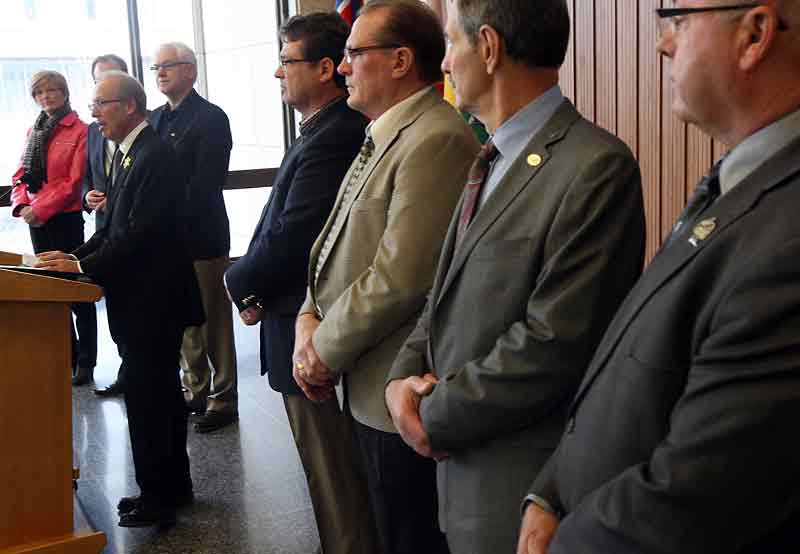Mayors frustrated with province
Accuse NDP of ignoring municipal needs
Advertisement
Read this article for free:
or
Already have an account? Log in here »
To continue reading, please subscribe:
Monthly Digital Subscription
$0 for the first 4 weeks*
- Enjoy unlimited reading on winnipegfreepress.com
- Read the E-Edition, our digital replica newspaper
- Access News Break, our award-winning app
- Play interactive puzzles
*No charge for 4 weeks then price increases to the regular rate of $19.00 plus GST every four weeks. Offer available to new and qualified returning subscribers only. Cancel any time.
Monthly Digital Subscription
$4.75/week*
- Enjoy unlimited reading on winnipegfreepress.com
- Read the E-Edition, our digital replica newspaper
- Access News Break, our award-winning app
- Play interactive puzzles
*Billed as $19 plus GST every four weeks. Cancel any time.
To continue reading, please subscribe:
Add Free Press access to your Brandon Sun subscription for only an additional
$1 for the first 4 weeks*
*Your next subscription payment will increase by $1.00 and you will be charged $16.99 plus GST for four weeks. After four weeks, your payment will increase to $23.99 plus GST every four weeks.
Read unlimited articles for free today:
or
Already have an account? Log in here »
Hey there, time traveller!
This article was published 26/04/2013 (4580 days ago), so information in it may no longer be current.
The mayors of Manitoba’s largest urban centres gathered Thursday to condemn the provincial government for failing to address their infrastructure priorities in last week’s budget.
A day after blasting the provincial NDP’s proposed one-point PST hike as “the biggest tax grab in history,” Mayor Sam Katz hosted the mayors of Brandon, Morden, Winkler, Steinbach, Thompson and Portage la Prairie at city hall. They were joined by Association of Manitoba Municipalities president Doug Dobrowolski.
The municipal leaders’ message boiled down to this: The Selinger government is raising taxes to fund provincial priorities while largely ignoring the deteriorating state of municipal roads, bridges, sewer and water systems and community centres.

“Every municipality in Manitoba is struggling right now. Our infrastructure, whether we’re talking about roads, water and sewer lines, even old buildings, they all need attention,” said Katz, who urged Manitobans to “call Broadway” if they’re fed up with the condition of their streets, sidewalks and libraries.
“I think the unity is important to show,” the Winnipeg mayor said. “We’re all saying the same thing. We all feel the same thing. The message is consistent.”
Municipal leaders have long called for funding equal to a percentage point of the PST — or $277 million annually — to be allocated to municipalities on a per-capita basis. Winnipeg’s share in such a scenario would be $152 million a year. They also want this funding to be over and above existing grants to municipalities so that they can make a dent in a massive infrastructure spending deficit.
“This isn’t a partisan issue. This is municipalities (whose) backs are to the wall,” said Brandon Mayor Shari Decter Hirst.
She said not only are municipalities unable to maintain their existing infrastructure, they will lack the financial capacity to match federal and provincial funding in future joint projects with the two senior levels of government.
The municipalities are upset the provincial government intends to use the percentage-point increase for a wide variety of projects. Broadway has even admitted it intends to use the PST hike to amass the necessary cash to match federal funding of tripartite projects with the municipalities.
Responding to the municipal leaders’ complaints, Premier Greg Selinger said all governments want more money to spend on infrastructure. He defended his government’s funding of municipalities, saying they fare well compared with other provinces.
“At a time when other provinces are slashing, at a time when the (Conservative) Opposition in the House says we should reduce expenditure… we’re increasing (funding by) about 8.5 per cent (to municipalities),” the premier said.
Local Government Minister Ron Lemieux made the same point outside the legislature Thursday, saying Manitoba is “very near the top” among provinces in municipal funding.
Lemieux noted that on Thursday, the same day the mayors were airing their beefs to the press, he was in Neepawa to announce the creation of a new three-year, $12-million municipal water infrastructure fund. The money will help municipalities with the design work they need to apply for federal-provincial funding for water and waste-water projects.
Meanwhile, municipal leaders complained the increase in the PST will significantly increase their costs. For the City of Winnipeg, the one-point hike means another $1.4 million a year in expenses.
Unlike with the federal GST, municipalities do not receive a PST rebate on goods and services they purchase.
Portage la Prairie Mayor Earl Porter said five years ago when his city built a new $45-million multiplex, Ottawa and the province each contributed $5 million.
But the province largely recouped its contribution in PST revenues from the large project.
In 2012, the province extended the PST to several new services, including insurance. That also increased municipal costs.
Last year, the municipalities’ combined insurance costs rose $768,000 due to the PST, said Dobrowolski. With this year’s one-point hike, the insurance tax bill will climb to more than $800,000.
larry.kusch@freepress.mb.ca


